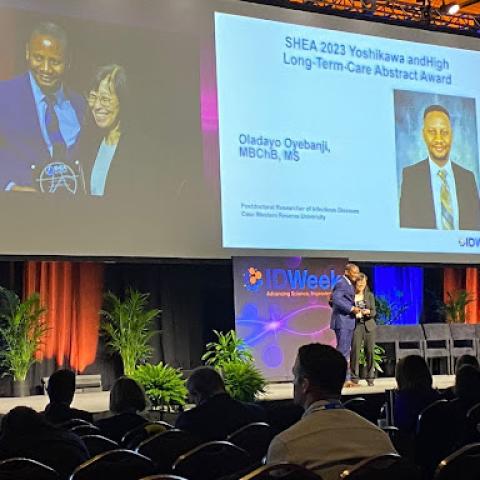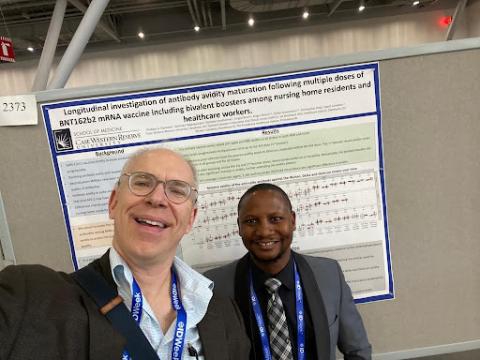Case Western Reserve University postdoctoral fellow Oladayo Oyebanji has earned the Society for Healthcare Epidemiology of America’s Yoshikawa and High award for an abstract he presented at the society’s IDWeek in October. The award honors work that focuses on solving healthcare epidemiology, antibiotic stewardship and infectious disease issues in long-term care settings.
Oyebanji’s research looks at how tightly antibodies induced by the Pfizer COVID-19 vaccine bind to the virus in nursing home residents, showing that avidity (the overall strength of the antibody-antigen interaction), in addition to the quantity of antibodies, is also important when assessing vaccine function in this population.
“Avidity increased after the initial two doses and continued to increase for months down the line,” said Oyebanji. “But, once you get your first booster shot—likely the third dose—avidity jumps up markedly.”
However, Oyebanji’s research also shows that avidity levels max out at a high level and doesn’t go any further after four, five and six doses.
“His work shows that getting the COVID-19 booster vaccine is particularly important in getting the most effective antibodies,” said David H. Canaday, MD, Case Western Reserve University professor of infectious disease and associate director of research at the Geriatric Research, Education and Clinical Center at the Louis Stokes Cleveland Department of Veterans Affairs Medical Center. “His research shows that even in this frail nursing home population, they can make antibodies that bind very tightly to the vaccine."
The research is part of an ongoing study that includes grants from the National Institutes of Health, the Centers for Disease Control and the Veterans Administration.
Oyebanji, an Educational Commission for Foreign Medical Graduates-certified Match 2024 residency candidate, is thankful to colleagues and mentors who continue to support his career and his successes.
“You are just excited to be going to a conference and present a poster, and then you get a notification that your abstract won an award,” said Oyebanji. “I haven’t found the right words to describe how I feel about it, but for me, it was actually how my PI felt. He was super proud of me, and that’s still a feeling I haven’t gotten over.”
After years of basic and translational research, the Nigerian native is looking to transition to clinical residency.
In his free time, Oyebanji can be found playing recreational soccer at DiSanto field and supporting the Manchester United Football Club of England.
His advice for students considering a similar path is simple.
“I think it is really important to make the most of even the smallest opportunity,” said Oyebanji. “Every step is a learning process. Make sure you are putting in all the work needed and making the most of each opportunity.”



